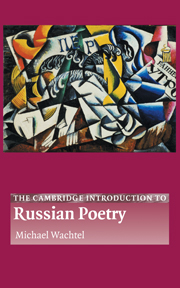Book contents
- Frontmatter
- Contents
- Preface
- Acknowledgments
- Note on translations and transliterations
- Introduction
- Part I Concepts
- Part II Interpretation
- Chapter 4 From the ode to the elegy (and beyond)
- Chapter 5 The ballad
- Chapter 6 Love poetry
- Chapter 7 Nature poetry
- Chapter 8 Patriotic verse
- Conclusion: poetry and pattern
- Bibliography
- Suggested further reading
- Index of poetic terms
- Index of names and works
Chapter 6 - Love poetry
Published online by Cambridge University Press: 05 June 2012
- Frontmatter
- Contents
- Preface
- Acknowledgments
- Note on translations and transliterations
- Introduction
- Part I Concepts
- Part II Interpretation
- Chapter 4 From the ode to the elegy (and beyond)
- Chapter 5 The ballad
- Chapter 6 Love poetry
- Chapter 7 Nature poetry
- Chapter 8 Patriotic verse
- Conclusion: poetry and pattern
- Bibliography
- Suggested further reading
- Index of poetic terms
- Index of names and works
Summary
О, бы́ть поки́нутым – како́е сча́стье!
Како́й безме́рный в про́шлом ви́ден с;ве́т –
Так после ле́та – зи́мнее нена́стье:
Всё по́мнишь со́лнце, хоть его́ уж не́т.
Кузмин, «О, бы́ть поки́нутым»Oh, to be jilted – what happiness!
What measureless light is visible in the past –
It's like the foul winter weather after summer:
You still remember the sun, though it's no longer there.
Kuzmin, “Oh, to be jilted”As we have seen, the ode, elegy, and ballad have distinct formal and stylistic features; moreover, they are associated with specific literary-historical movements. The love poem, in contrast, can be found in almost every age and with great stylistic variety. What are the prime markers of this genre? The most obvious is its theme: love. But it is a peculiarity of the truly powerful, affirmative human gestures – laughter, pleasure, love – that they can be diminished by introspection and analysis. Relatively few love poems celebrate a love that actually exists. Instead, poets tend either to anticipate it or to look nostalgically (sometimes painfully) back to it. Love poems are dynamic, marked by sudden shifts in emotion and perspective. They prefer the past or future to the present tense. This is poetry that thrives on absence, on temporal and spatial displacement.
The cast of characters in love poetry rarely varies. These poems concern the poet and his/her beloved, with the former addressing the latter. Accordingly, the standard configuration of pronouns is that of “I” and “you”.
- Type
- Chapter
- Information
- The Cambridge Introduction to Russian Poetry , pp. 95 - 109Publisher: Cambridge University PressPrint publication year: 2004

